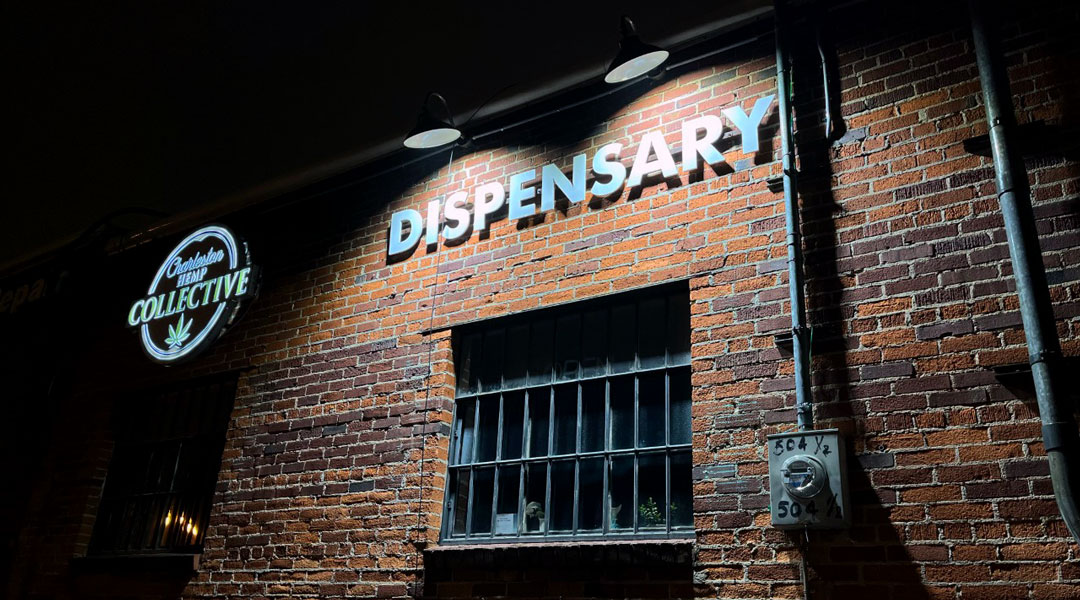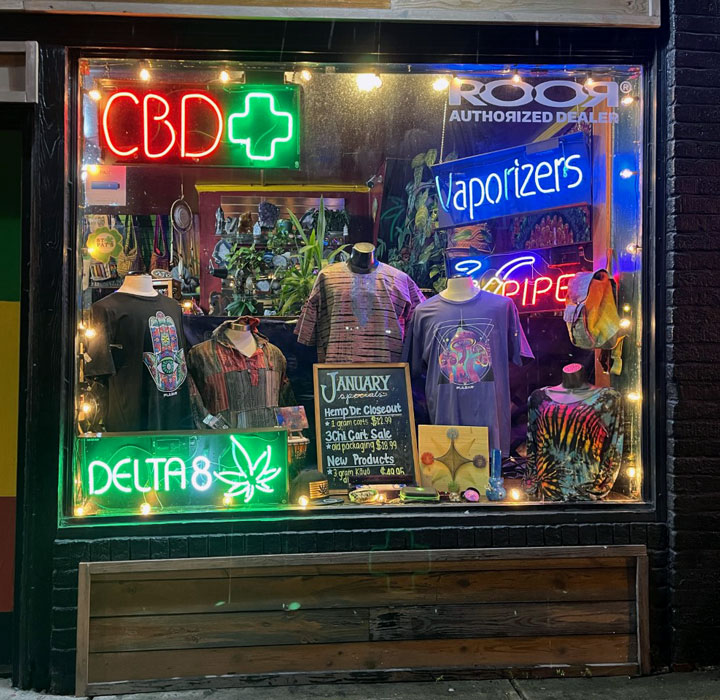The Charleston Hemp Collective store in downtown Columbia. Under the S.C. Compassionate Care Act, stores such as this could become a “therapeutic cannabis pharmacy” by applying for a state permit. (Photos by Wade Rainey)
South Carolina’s medical marijuana bill could, after six years, be passed into law.
The South Carolina Compassionate Care Act would make marijuana available for the treatment of approved medical conditions, including multiple sclerosis, cancer and glaucoma. The drug contained in marijuana reduces pain and inflammation and can treat the nausea and vomiting caused by chemotherapy.
If the bill passes, South Carolina would become the 38th state to legalize medical marijuana.
In 2022, the bill came closer than ever to becoming law. It passed the state Senate by a vote of 28-15 but failed in the House.
The bill called for a sales tax to be applied. But the House holds the position that any legislation with a revenue-raising component needs to originate in the House, said Sen. Tom Davis, R-Beaufort, one of the bill’s sponsors and a key proponent.
That clause now has been removed, and the law was reintroduced in the Senate on Jan. 19.
“We had the votes last year to pass it,” Davis said. “There was a majority of House members who wanted to pass the bill, and just this procedural objection was really the only thing stopping it from getting passed.”
The bill would be one of the most conservative medical marijuana bills in the country if it passes, according to Davis. Patients with an approved condition would not be able to smoke marijuana. Instead, they would use cannabis oils or oil-based products.
Patients only would be able to obtain two weeks’ worth of a marijuana product at a time. And, before prescribing, doctors need to check if patients have a history of substance abuse.
Davis believes the bill would be a positive step forward for the South Carolina medical community.
“The science, in regards to the medical benefits of cannabis, is just overwhelming,” he said. “There are just too many empirical peer-reviewed studies that prove it can help in instances where pharmaceuticals fall short.”
Jill Swing, the executive director of the South Carolina Compassionate Care Alliance, agrees with Davis. She said her daughter suffers from intractable epilepsy, so she has seen the benefits of medical marijuana and the consequences that come with keeping it illegal.
“I have heard hours and hours of testimony from patients from across the state – from patients who have unfortunately had to leave this state in order to have legal access, from patients in the state who have chosen to stay and use cannabis illegally and risk arrest,” she said.
Swing and her organization have worked closely with Davis and other bill sponsors for years, providing town hall-style educational sessions on the bill, meeting with patients and sharing their stories.
Patients in this state have been waiting patiently for lawmakers to understand the urgency of the need. And she’s hopeful that change is coming.
“It will be a very exciting time,” Swing said.
People on both sides of the debate still are raising issues with the bill, though.
Law enforcement officials have been vocal opponents of the bill throughout the legislation process. And this go-round is no different.
Mark Keel, chief of the State Law Enforcement Division. said in a statement that his stance on the bill has not changed. Keel previously has voiced criticized marijuana for not being FDA approve. He also worries the drug could later become legal for recreational use.
Bob Chapman, founder and executive director of the South Carolina Cannabis Coalition, thinks the bill doesn’t go far enough.
“The people can ask for new conditions to be added,” Chapman said. “But then it has to be voted on. And they usually have discussion and research, and it takes so long to add a new condition (that it could treat). We should get as many as we can into the bill right off the bat. Now, in Alabama, there are 31 conditions listed. That’s a good number. In South Carolina, we had 12.”
Chapman also said he thinks the smoking ban is too restrictive.
“Smoking is the fastest method,” he said. “If somebody’s in pain, it’s my opinion they shouldn’t have to suffer in pain longer.”
Chapman thinks, too, the “diversion clause” in the bill is overly harsh. This clause prohibits medical cardholders from sharing their marijuana and establishes heavy penalties for doing so.
If caught, a patient would lose their medical card, face fines of up to $5,000 and a prison sentence of up to five years.
Both the House and Senate versions of the bill are currently in committee, waiting to be voted on.



